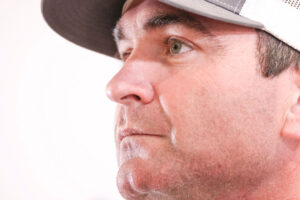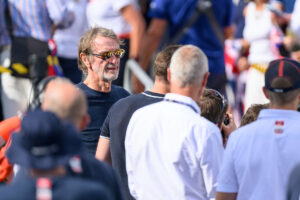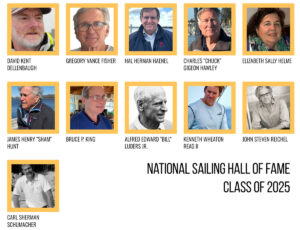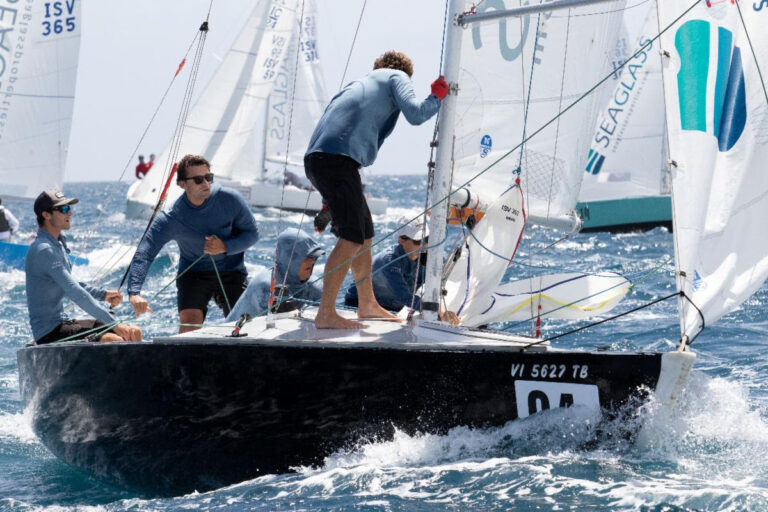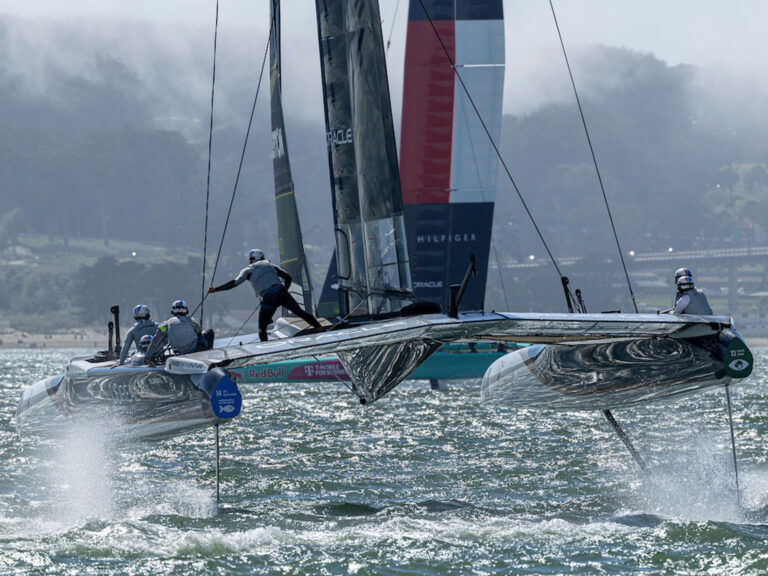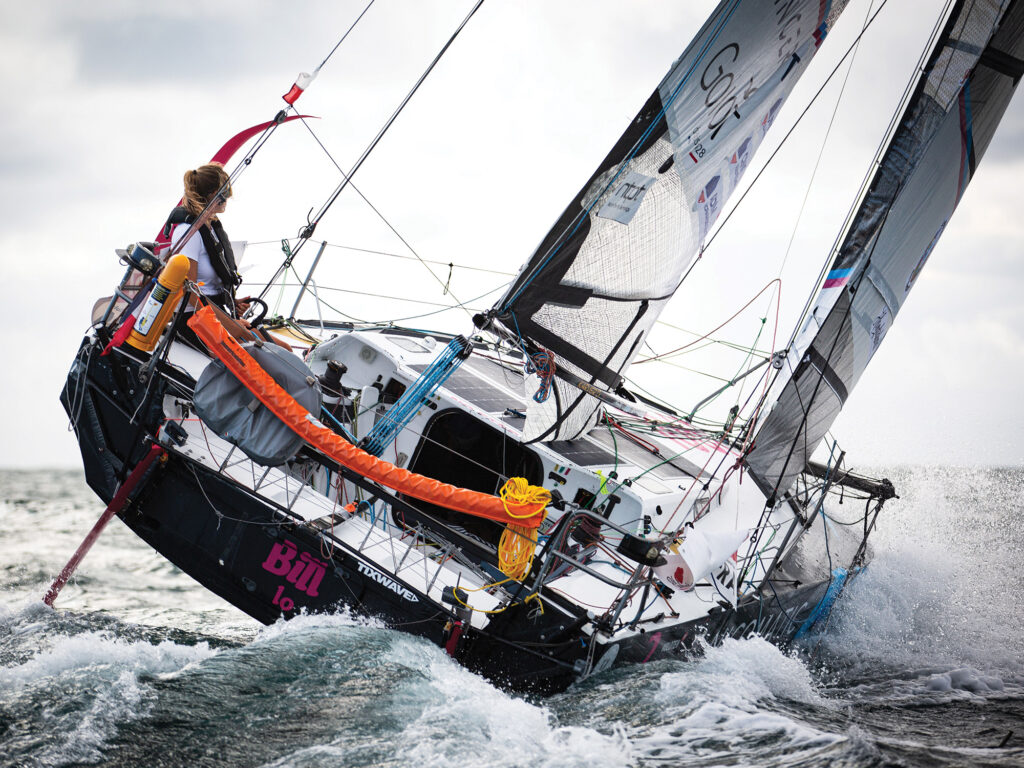
As the sun dips below the horizon, casting a warm glow over the Caribbean waters, I can’t believe my eyes. The island of La Désirade looms on the horizon, a beacon of achievement after 4,050 grueling miles across the Atlantic alone. For 12 days of relentless sailing, my boat and my world—the 21-foot Classe Mini, Nicomatic—has soared over waves and chased schools of silver flying fish. The windward foil has unmercifully sent cascades of water over me, leaving my skin blistered and scarred.
The distant sound of an engine pierces the air, growing louder as a tiny object on the horizon speeds toward me. Excited shouts and screams reach my ears, and soon, familiar faces emerge. Friends and family wave a poster that reads: “Welcome our northern star.” Emotions surge through me as I grasp my accomplishment. I am the first woman to cross the Atlantic on a fully foiling boat, and the first person to do so on a fully foiling monohull. This triumph is the culmination of two years of effort from a dedicated team.
My journey to the finish of La Boulangere Mini Transat 2023 began in October 2020 in Paris, after completing my master’s in Nuclear and Materials Science Engineering. Despite enrolling in a Physics doctorate program at Ecole Polytechnique, my passion for sailing led me to the challenging world of foiling boats. I invested all of my savings and half of my monthly salary into acquiring an International Moth and diving headfirst into the competitive realm of this prestigious foiling and development class.
Fueled by motivation, I took my commitment to the extreme. I rented out my flat for three months and lived in my car in my university’s parking lot, scraping together every penny to afford the fuel needed to transport my boat to various racing events. However, harsh reality set in, and I soon realized that maintaining this lifestyle was financially unsustainable. Undeterred, I began seeking sponsorship opportunities to keep my dream afloat. This pivotal moment led me to the Nicomatic Group, and my journey took a remarkable turn.
Nicomatic, an international technology company, sponsored my Moth sailing until the 2021 Moth Worlds in Malcesine, Italy. Together, we conceived the Mini Nicomatic, an innovative 6.5-meter boat designed by naval architect Sam Manuard and foiling specialist Benoit Marie (Mini Transat winner in 2013), who also became my coach and co-skipper, as well as life partner.
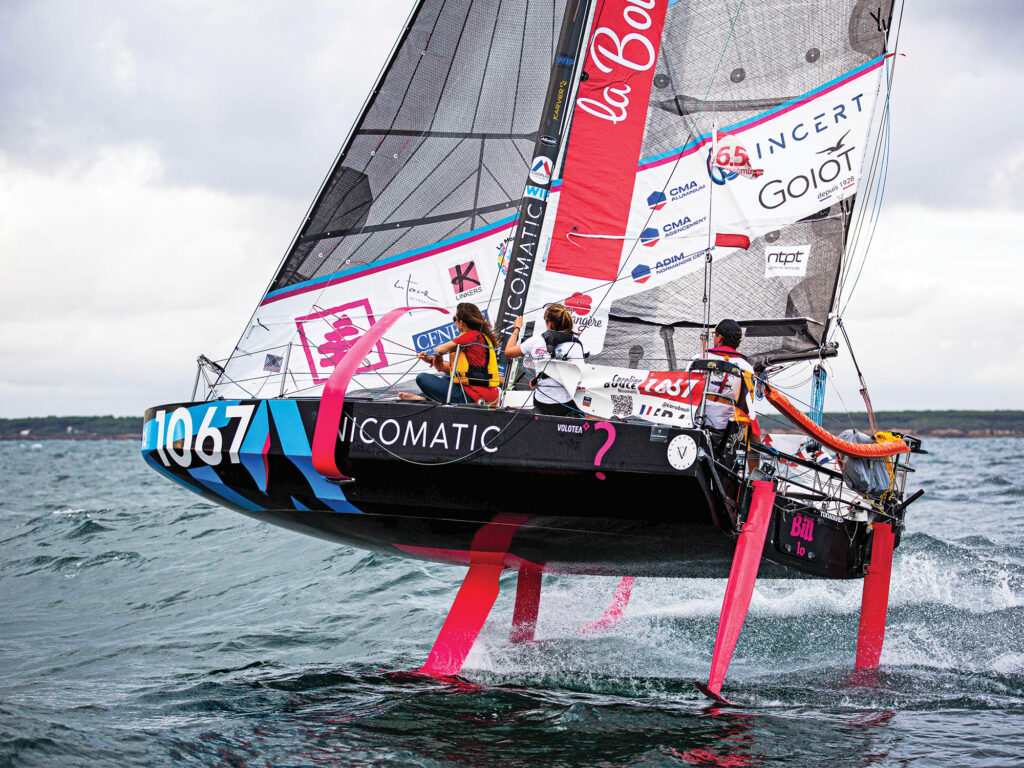
In less than five months, the boat took shape under the dedication of a team led by Kilian Goldbach and Malric Leborgne. Goldbach, a key figure in the team, worked tirelessly, dedicating 100 hours a week for several months to ensure that Nicomatic would hit the water on time. During the build, I realized the need to build experience in offshore sailing because I had sailed only dinghies before and was a complete offshore-sailing novice when I took up this challenge. I set out on a trans-Atlantic crossing in a Volvo 65, and it was on this boat, off the Canary Islands, with winds gusting well over 30 knots and water splashing all over the deck, that I spent my first night at sea.
We launched Nicomatic in May 2022, and within a week, I embarked on my first solo race, marking the beginning of a transformative journey. Ten minutes into the sail, I realized that I had never jibed a spinnaker solo before, so I had to make it all up as I went. The focus of this first year was qualification for the Mini Transat, involving 1,500 nautical miles of racing and a 1,000-nautical-mile qualifying course—which was a resounding success. At the end of the season, more than 100 people from Nicomatic joined me for a week of sailing to discover the amazing boat they had sponsored.
In December 2022, we installed and tested the foils, achieving notable success. The boat smoothly lifted off in 8 knots of wind on our first try. In the second year of my campaign (2023), our primary goal was to address potential issues with the boat before stepping off for the trans-Atlantic race in September. Despite many challenges, we not only secured victories in several races, but we also witnessed the boat’s incredible potential—up to 100 percent faster than our competitors. The focus then shifted to making Nicomatic more reliable, a crucial aspect for the impending journey. Personally, I needed to overcome my fear of the speed and brutality of the boat, and that transformation occurred only a month before the Mini Transat when I clinched victory in the first leg of a solo race from Port Bourgenay, France, to Getxo, Spain.
A major challenge I faced throughout the project, however, was securing additional sponsors. Despite Benoit’s efforts in bringing in those who funded his sailing career, I struggled to meet the budget requirements. This led me to borrow substantial amounts of money just to make it to the starting line.
The journey to the start was intense, marked by tireless efforts and the invaluable support of volunteers, especially a schoolboy named Elvis, who dedicated his entire summer holiday, working from 6 a.m. to 6 p.m., for free, driven by a passion to learn and contribute to the boat’s preparation. Seeking assistance on Instagram yielded an overwhelming response, with numerous individuals, some unfamiliar to me, extending help in various capacities. However, multiple unexpected challenges emerged, such as the Classe Mini’s last-minute rule change regarding foils. A monumental effort from the team altered the foils in time for the race to make Nicomatic compliant.
On September 26, 2023, I set sail on the Mini Transat—solo, unassisted and without communication— toward the Canary Islands, where the first leg finished, and then in the direction of Guadeloupe. The initial stretch proved far more mentally challenging than I anticipated. My batteries struggled to charge, leaving me with insufficient energy on board. Consequently, I had to navigate the boat continuously for 10 days without respite, leading to exhaustion and minimal sleep. Sleep deprivation took its toll, causing disorientation, hallucinations, and numerous mistakes. Light winds, contrary to the forecast, added to the nerve-wracking conditions. Despite these difficulties, there were remarkable moments, such as a whale leaping in front of me and encountering dolphins and orcas. It was thrilling and unnerving.
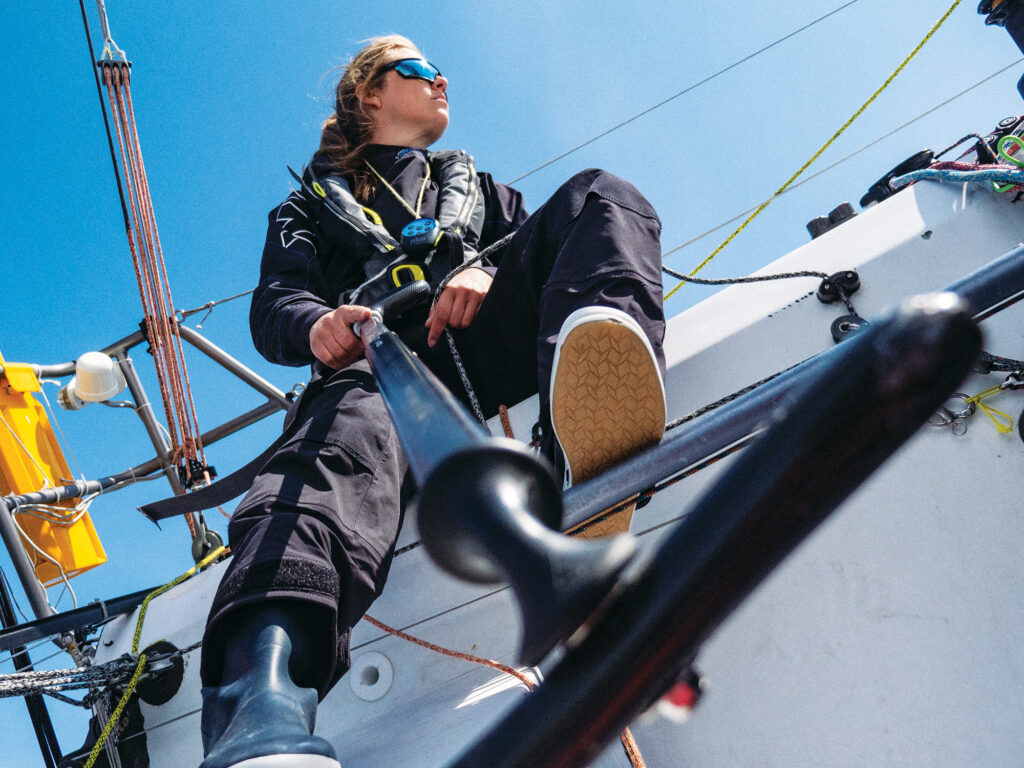
The second leg presented a fresh set of challenges. Soon after the start, my autopilot stopped working, and despite my attempt to fix it, I had to make an unscheduled stop in El Hierro, the last island before the open Atlantic. There, I encountered amazing individuals who provided me with food, assistance and great company. After a 12-hour stopover, fueled by the music my newfound friends played on their instruments, I resumed the journey and embarked on a remarkable comeback, foiling my way to ninth position. I faced new technical hurdles, however, such as a broken spinnaker halyard that hampered me when the wind dropped for two days. Numerous electronic malfunctions added to the challenges, regretfully affecting what turned out to be the least-prepared part of my boat. The autopilot’s unreliable performance forced me to drive the boat a minimum of 12 hours a day. The remaining hours were spent studying the weather, making repairs, eating and sleeping.
The challenging reality of the crossing was the tough conditions. I dealt with issues in two sealing systems—one for the foils and one for the keel—which resulted in perpetual dampness for 12 days. The toll on my body was visible, evidenced by scars and partial skin loss. Maintaining my well-being became a daily struggle, managing with damp food, floating storage bins, and the constant task of draining 200 liters of water every two hours. Five days before the finish, I ran out of water and relied on the last sips of Coca-Cola for survival. It was an uncomfortable experience, enduring days of hardship with limited hydration.
The misery was soon forgotten as I sailed into Port Saint Francois in Guadeloupe, with my family and friends. Their support made this achievement possible. They were my driving force over every mile and every hour. I will be forever thankful for them. It was 8 p.m. when we coasted into the marina to cheers, to “Sweet Dreams” by Eurythmics, and the clapping from packed restaurants, which marked the end of one adventure and the beginning of the next.

